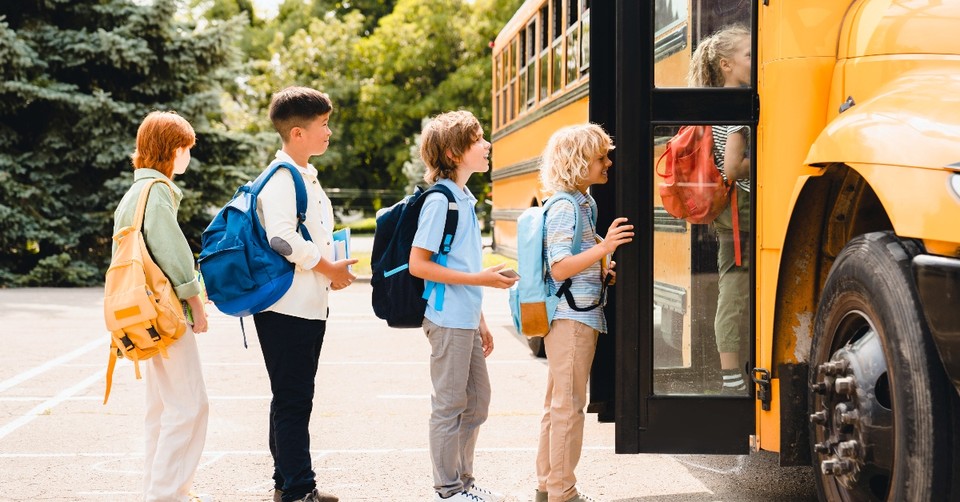Routines and Mindsets to Prepare Your Kids for Back to School

Whether your kids go to public, private, or homeschool, the re-entry into the school year can be tough on everyone. Here are some suggestions for helping your kids prepare for school that will make the transition easier on them—and you.
Be positive.
Often, the very mention of school while summer vacation is in full swing can make any child or teen whine. Don’t try to talk them into being eager to go back to school if they’re not, but do encourage them to think about the things they like about school.
Make a list of school pros and cons.
This can be a guide for you to discuss both the positives and the negatives. Let them find solutions to encountering the less desirable elements with different approaches. For example, if they’re dreading a particular class, ask them what would make attending that class better for them. It could be decorating a notebook with positive sayings or asking the teacher to sit by a window. The key is to let your children come up with the solution, not you. After all, they’re the ones who will have to employ it.
Ease into school bedtimes.
Whether your child is going into kindergarten or ninth grade, sleep is vital to a successful school year. While summertime means a more relaxed bedtime, you should start about a week before school, getting back to the school year bedtime. Move bedtime forward 10 to 15 minutes every day until you reach the right time. Reinstate a good bedtime routine that includes no electronics at least an hour before lights out. Ensure everyone docks their devices in a central location outside their rooms to avoid middle-of-the-night temptations.
Figure out logistics.
How will your kid get to school? If it’s the bus, make sure they know where to wait and which bus to board. If your child is riding the bus for the first time, talk to your neighbors about the exact pickup location and timing. If you’ll be taking them, discuss departure and pickup times. If it’s walking, walk the route a few times ahead of the first day.
Get supplies.
From backpacks to pencils, kids need a lot of supplies to start their school year on the right foot. Make sure you send them back to school with everything they need. If your budget can swing it, buy them the special gel pens or cool reusable lunch sack they want rather than the plain one they don’t. It can give a kid confidence to have the “right” pens, notebooks, and stickers for their binders.
Talk about lunch.
You’ll need to figure out if they’ll be bringing lunch or buying it at school. If bringing lunch from home, you’ll need an idea of what they’ll be packing so you can have it on hand. Having them assemble the components of their lunch the night before will make the morning rush out the door easier.
Visit the school.
Meeting your child’s teacher can help ease the start of a new year. Some schools offer a meet-and-greet at the school prior to day one. Middle and high schools usually have a day that students can walk the halls with their schedules to find their classrooms and meet their teachers.
Find space for homework.
When our kids entered middle school, we had to rethink their homework area because they needed space for a laptop and books. We ended up configuring part of our downstairs with two card tables for my boys while my girls had space upstairs. Thinking about this before the start of school made it easier for them to transition to homework without scrambling for a place to do it.
Recognize transitions are hard.
Some years, your kids will head back to school with nary a ripple, while other years, it will feel as if a tsunami has hit your household. Be prepared for tired, whiny kids and teens the first week as they navigate new surroundings, peers, teachers, and a new grade.
Give them space and grace.
Remember, home is a safe place, so often, that’s where our kids fall apart or act up the most. When my kids each started kindergarten, the first month was rough with their misbehaviors at home after school. After hearing from their teachers how well-behaved my kids were in the classroom, I realized what was happening—they were using up all their good behavior learning and following the classroom rules and had nothing left by the time the bus dropped them off. This helped me provide a calm response to their being a hot mess. It soon passed, and things returned to a more even keel. Even with my teenagers, I try to give them space and grace those first few weeks of school.
Let them have ownership of their school year.
Our children are more capable than we give them credit for, so this year, let’s all take a giant step back when it comes to homework. Let’s let our children have complete ownership of their homework and class projects. We can—and should—provide guidance, such as giving them an end time when homework must be finished, but we should also let them figure out how to accomplish their school-related tasks.
Build in free time.
The start of the school year often means starting other activities like music lessons, sports, and dance classes. This year, don’t overpack the family schedule with too many activities. Give your children breathing room by allowing them lots of downtime. Having the freedom to organize the hours after school in any way they want helps your child with time management and can also refresh their brains after a day of learning. It also allows for more family dinners, which has proven to keep families connected and strong.
Plan the morning routine.
Something about being in a rush can set the wrong tone for the day, so do what you can the night before to ensure your kids won’t be frazzled before they walk through the school door. Laying out clothes and checking backpacks for supplies and homework after dinner can help everyone avoid a frantic rush in the morning. But don’t do this yourself—this becomes part of your child’s nighttime routine.
Resolve to not focus too much on grades.
Sometimes, when our kids are in school, we talk way too much about their academic performance, i.e., what grades they receive for what class or assignment. This year, why don’t we instead focus on what they enjoy learning about, who they sit next to at lunch, what games they like to play during recess, and a host of other non-academic pursuits that make up our children’s school days?
Years ago, we started asking, “Tell us something about your day” at dinnertime, giving each child and adult a chance to share something. We ended up learning a lot about each other without focusing on scores, grades, or other benchmarks of “success.” We also didn’t quiz our kids or high schoolers about their grades all the time. Periodic check-ins are good, but an overemphasis on grades alone misses the point of school, which is to learn.
Continue or start a back-to-school tradition.
Some parents have their kids pose on the front walk holding a sign with their grade for a photo. Maybe you have a special dinner on the first day of school, or everyone goes out for ice cream to celebrate the start of a school year. Whether you have a back-to-school tradition or not, you can always start one this year.
Incorporating these suggestions into your back-to-school planning will lay a firm foundation for your children’s academic success. If your school is already in session, it’s not too late to try some tips to smooth out any wrinkles.

Originally published August 15, 2022.




